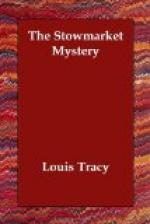“What else have you written there?” he said, and Brett could not help but admire his forced composure.
“Nothing of any material importance. You were arrested, after an interval of some days, as the result of a coroner’s warrant. You explained that you had a vivid dream, in which you saw your cousin stabbed by a stranger whom you did not know, whose face even you never saw. Sir Alan was undoubtedly murdered. The dagger-like attachment to your Japanese sword had been driven into his breast up to the hilt, actually splitting his heart. To deliver such a blow, with such a weapon, required uncommon strength and skill. I think I describe it here as ‘un-English.’”
Brett referred to his scrap-book. In spite of himself, he felt all his old interest reawakening in this remarkable crime.
“Yes?” queried Hume.
The barrister, his lips pursed up and critical, surveyed his concluding notes.
“You were tried at the ensuing Assizes, and the jury disagreed. Your second trial resulted in an acquittal, though the public attitude towards you was dubious. The judge, in summing up, said that the evidence against you ‘might be deemed insufficient.’ In these words he conveyed the popular opinion. I see I have noted here that Miss Margaret Hume-Frazer was at a Covent Garden Fancy Dress Ball on the night of the murder. But the tragic deaths of her father and brother had a marked influence on the young lady. She, of course, succeeded to the estates, and decided at once to live at Beechcroft. Does she still live there?”
“Yes. I am told she is distinguished for her charity and good works. She is married.”
“Ah! To whom?”
“To an Italian, named Giovanni Capella.”
“His stage name?”
“No; he is really an Italian.”
Brett’s pleasantry was successful in its object. David Hume regained his equanimity and sat down again. After a pause he went on:
“May I ask, Mr. Brett, before I tell you my part of the story, if you formed any theories as to the occurrence at the time?”
The barrister consulted his memoranda. Something that met his eyes caused him to smile.
“I see,” he said, “that Mr. Winter, of Scotland Yard, was convinced of your guilt. That is greatly in your favour.”
“Why?”
Hume disdained the police, but Brett’s remark evoked curiosity.
“Because Mr. Winter is a most excellent officer, whose intellect is shackled by handcuffs. ‘De l’audace!’ says the Frenchman, as a specific for human conduct. ’Lock ’em up,’ says Mr. Winter, when he is inquiring into a crime. Of course, he is right nine times out of ten; but if, in the tenth case, intellect conflicts with handcuffs, the handcuffs win, being stronger in his instance.”
Hume was in no mood to appreciate the humours of Scotland Yard, so the other continued:




